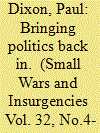| Srl | Item |
| 1 |
ID:
181048


|
|
|
|
|
| Summary/Abstract |
There are contrasting interpretations of the Northern Ireland peace process which have competing implications for the lessons to be drawn from the conflict. This article offers a Constructivist Realist critique of three leading perspectives on the peace process: Neoconservative, Cosmopolitan and Conservative Realists (or Consociationalists). The Neoconservative perspective emphasises the importance of security policy in defeating terrorists before negotiations. By contrast, Cosmopolitans and Conservative Realists emphasise the importance of constitutions and tend to ignore security. Constructivist Realists argue that all three accounts are over-generalised, provide inadequate understandings of politics and, therefore, the relative success of the peace process.
|
|
|
|
|
|
|
|
|
|
|
|
|
|
|
|
| 2 |
ID:
161567


|
|
|
|
|
| Summary/Abstract |
This paper implements a constructivist approach from the discipline of International Relations (IR) to investigate the interplay between international politics and cyberspace, and explains why the Taiwanese government has been relatively slow to exploit cyber warfare for national-defense purposes prior to 2016. While this paper acknowledges the technology determinist’s argument that new technology can set the direction of politics, developments in Taiwan have brought to our attention a different perspective, which is that politics can still shape the future direction and use of technology. This analysis enables us to understand, through the case of Taiwan, how politics trumps both technical decisions and the overall direction of technology. Looking closely at the case of Taiwan’s cybersecurity contributes to the broader IR literature concerning the effects of norms and identities, and extends policy analysis to the domain of cyberspace. It establishes a dialogue between the IR literature and Cybersecurity Studies, and reduces the knowledge gap in understanding Taiwan’s security policy.
|
|
|
|
|
|
|
|
|
|
|
|
|
|
|
|
| 3 |
ID:
120164


|
|
|
|
|
| Publication |
2013.
|
| Summary/Abstract |
The rationalist-constructivist divide that runs through the discipline of International Relations (IR) revolves around two figures of agency, the rational actor and the constructivist "self." In this article I examine the models of agency that implicitly or explicitly underpin the study of international politics. I show how both notions of the rational actor and the constructivist self have remained wedded to individualist understandings of agency that were first incarnated in the discipline's self-understandings by Hobbes's natural individual. Despite its turn to social theory, this persistent individualism has hampered constructivism's ability to appraise the ways in which the actors and structures of international politics mutually constitute one another "all the way down." My purpose is to lay the foundations for a nonindividualist, adequately relational, social theory of international politics. To this end I propose a third model of agency, Lacan's split speaking subject. Through a Lacanian reading of the Leviathan, I show how the speaking subject has in fact laid buried away in the discipline's Hobbesian legacy all along.
|
|
|
|
|
|
|
|
|
|
|
|
|
|
|
|